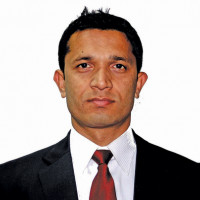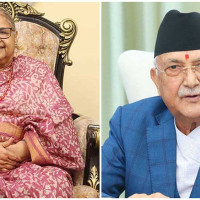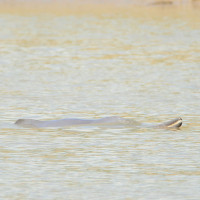- Friday, 9 January 2026
Development of full-fledged neighbourhood policy stressed
Kathmandu, June 26: Former Foreign Secretary and Ambassador Madhu Raman Acharya has suggested that Nepal should develop a full-fledged neighbourhood policy so that there will be no political differences among the parties and national stakeholders, and 'national interest' gets the front seat in bilateral and multilateral dealings.
Speaking at the Professor Yadu Nath Khanal Lecture Series 2, organised by the Ministry of Foreign Affairs (MoFA) in the capital on Sunday, the former diplomat who has also served as Nepal's permanent representative to the United Nations (UN) said that every diplomatic affair should be managed or practiced only by or through the foreign ministry.
According to him, to maintain best diplomatic and friendly relations with the neighbours, the country needs to resolve the outstanding issues with India like the Treaty of 1950, boundary issues, and Report of the Eminent Persons Group (EPG) on Nepal and India Relations.
Acharya also suggested implementing innovation in foreign affairs like third neighbourhood policy practiced by Mangolia.
Revitalise SAARC
He also stressed the need for resurrection of the South Asian Association of Regional Cooperation (SAARC).
"Current deadlock should be ended at the earliest. Nepal should start consultation at foreign minister or foreign secretary level to further the SAARC process," he said while suggesting that the prime minister of Nepal should also take initiative to revive the regional mechanism since Nepal is its current chair.
According to Acharya, Nepal can't withhold the SAARC process even though the initial euphoria is over and the region is in a situation to find a way to sustain it.
Likewise, he suggested taking into account the emerging alliances and partnership in the region, without being dragged into their competition. Mentioning the Indo-Pacific Strategy, Quadrilateral Security Dialogue, Regional Comprehensive Economic Partnership, and multilateral partnership between Australia, the United Kingdom, and the United States, he said, "We need not fear them but rather be vigilant without taking sides while not missing opportunities arising from them for our economic development," he said.
Acharya stated that the foremost priority of the country should be to strengthen relations with its immediate neighbours and benefit from their economic advancement.
He said that Nepal has largely failed to make itself a transit economy, and that has just remained a slogan. "Transit economy is about integrating ourselves into the value chains of India and China. We have to seize the opportunity when there is one," he said.
Acharya who also served at various UN Mission in many countries said that it is unfortunate that Nepali leaders tend to take sides based on conspiracy theories that spread on social media and make preferences on that basis.
"They externalize our political issue and let others interfere in the domestic matters," he said.
National interest paramount: FM Saud
Speaking on the occasion, Minister for Foreign Affairs, N.P. Saud, said that safeguarding national interests is paramount for every country and it is something which cannot be compromised under any circumstances.
He suggested for the application of eastern philosophy in foreign affairs practice. "Our ability to influence international politics is not viable, therefore, our diplomacy should apply other instruments," he said.
He also said that protecting and promoting the rights of Nepalis residing and working abroad are also a crucial sector upon which the country needs to work.
Likewise, Foreign Secretary, Bharat Raj Paudyal, informed that Professor Khanal was appointed as foreign secretary twice in 1961 and 1967. He had served as Ambassador of Nepal to India, United States of America, Canada, and China.
He took a lead in diversifying and expanding Nepal's diplomatic contacts and engagements, he said while adding that his consuls derived from his vast experience and incisive observation of international politics of his time continue to inspire and guide succeeding generations of Nepali intellectuals and foreign policy practitioners.












-original-thumb.jpg)



